Health
Meet Laura Silovsky, a Makerere University Graduate with Refugee Roots Bridging Continents
Published
5 months agoon
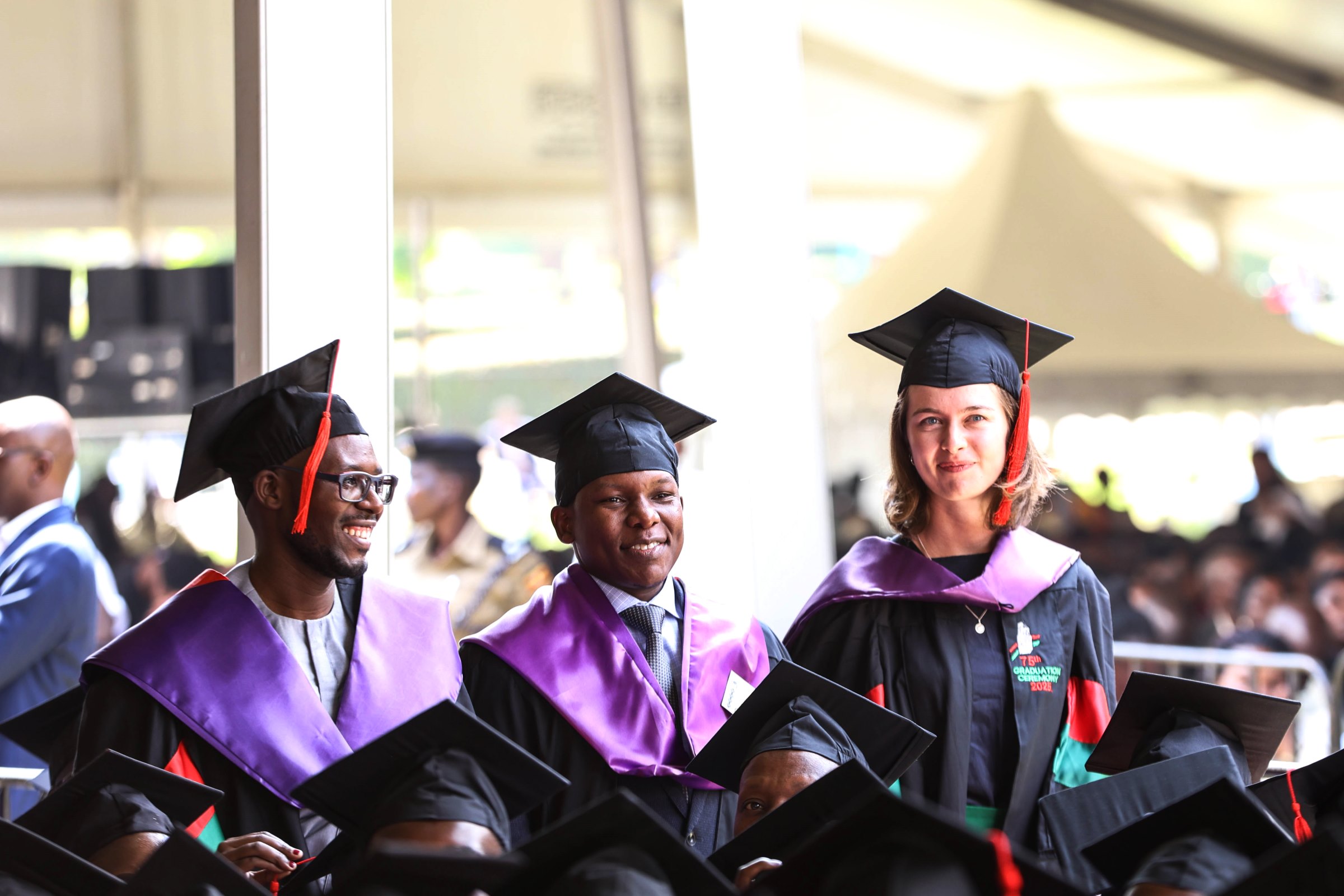
On Tuesday January 14, 2025, under the radiant rays of the Ugandan sun, Laura Silovsky crossed the stage at Makerere University’s 75th Graduation Ceremony to receive her master’s degree in Public Health Disaster Management (MDM). Hers is a story of passion, dedication, and curiosity to rewrite the narrative of global education. Among 1,813 master’s graduates, Laura’s story stood out, as a blend of refugee roots, firefighting bravery, and a drive to decolonize learning.
Laura’s journey began long before her arrival in Kampala. Born in the UK to a father who fled from Czechoslovakia’s dictatorship in the 1970s, she grew up understanding displacement intimately. “My father was a refugee. Why would I fear refugees?” she once asked during her research fieldwork in Uganda’s West Nile, where her empathy bridged divides.
“People in Uganda may not expect that a muzungu could be the child of a refugee, but my family experienced displacement from (what was then) Czechoslovakia as well as the effects of the protracted conflict in Northern Ireland. Fortunate to have been born in the UK, I was raised to appreciate that disasters can affect anyone, anywhere, anytime.
After studying Sustainable Development at the University of Edinburgh, I worked on a behavior change project tackling non-communicable diseases in Scotland,” Laura says.
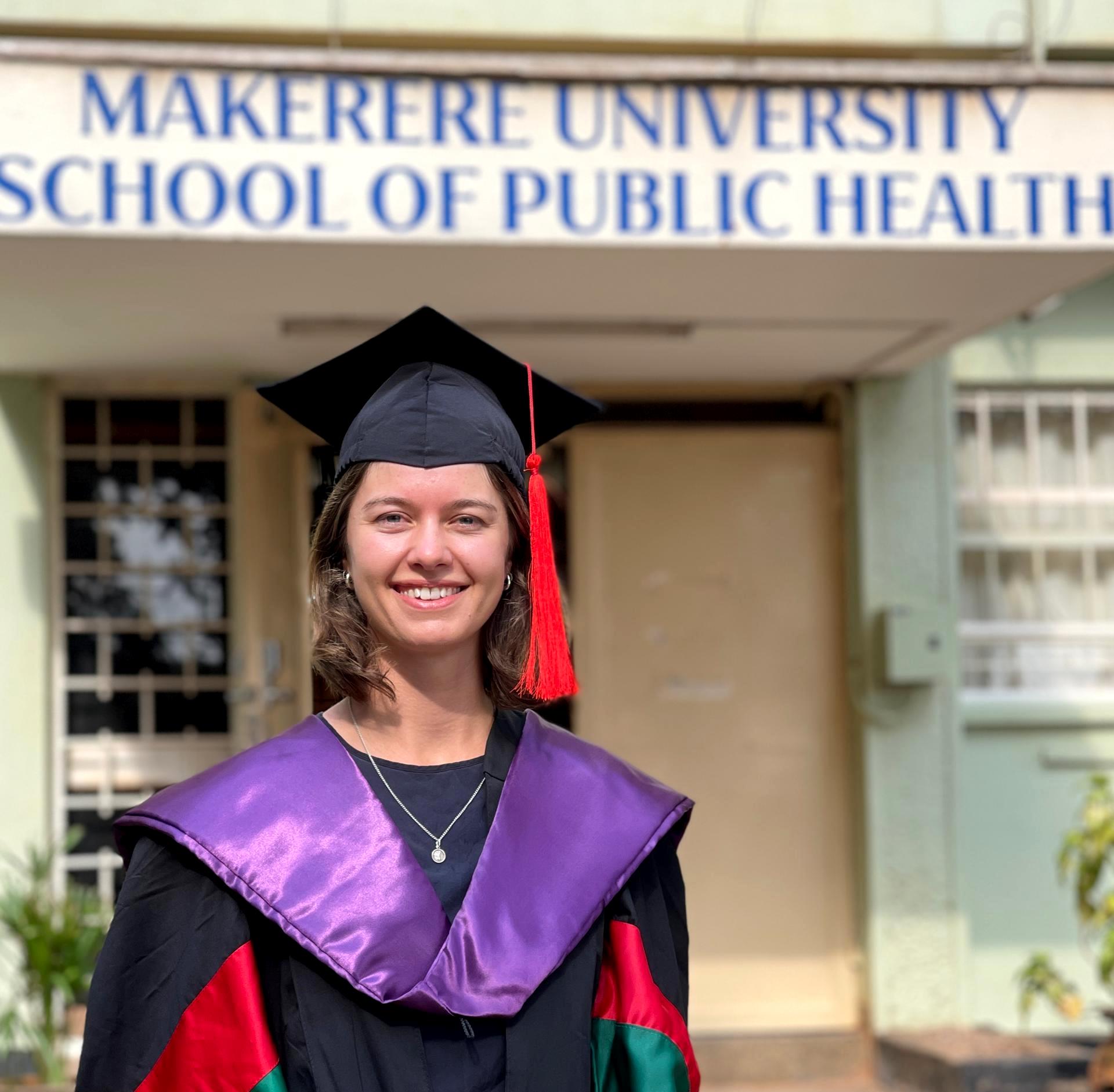
Her journey twisted through battling Australia’s bushfires and volunteering in a COVID pandemic, but it was Uganda’s welcoming refugee policies and Makerere University’s academic excellence that pulled her in next.
“In 2020, I relocated to Australia, just after the worst bushfires since records began and before the COVID-19 pandemic. The following two years, I qualified as a firefighter and supported bushfire recovery by volunteering with a community-based organization. After gaining some insight into these different disasters, I made the decision to return to higher education, and so I applied for the MDM programme at Makerere in 2022,” says Laura.
Armed with experience in emergency response, Laura was drawn to the field’s multidisciplinary nature and was convinced she needed to expand her expertise beyond immediate recovery efforts. She aimed to explore the full disaster management cycle and the intricate connection between health and environment.
“I needed to combine gaining academic knowledge with developing practical skills, so the field placement offered within the master’s degree in Public Health Disaster Management programme was a major motivator for me,” she shared.
The love for Uganda
Studying at the University of Edinburgh, Laura took a class in Kiswahili, that included a field-based short course on the Tanzanian shores of Lake Victoria. This experience sparked a desire to spend more time in the region, but she knew she needed to expand her skill set in order to genuinely add value to an organisation, if she was on the continent.
“I hoped studying at an East African university would teach me invaluable soft skills needed to work more effectively as an international team member. Makerere University School of Public Health (MakSPH) has a strong reputation, and I wanted to study somewhere that was locally grounded but globally recognized. Uganda’s progressive refugee policies were an added incentive to learn from experts here,” Laura says.
Laura’s intentional choice to decolonize her education
“I came to Uganda to learn from the experts here,” Laura declared, rejecting Eurocentric frameworks. “A big factor for me wanting to study at Makerere University was to decolonize my education, to recognize that the knowledge about responding to public health disasters and supporting refugees is here in Uganda,” she says.
She adds, “When I first arrived, I was quite vocal with my classmates about wanting to challenge that bias and truly acknowledge the wealth of knowledge within institutions like Makerere. The expertise here is invaluable, and I was intentional about decolonizing my education.”
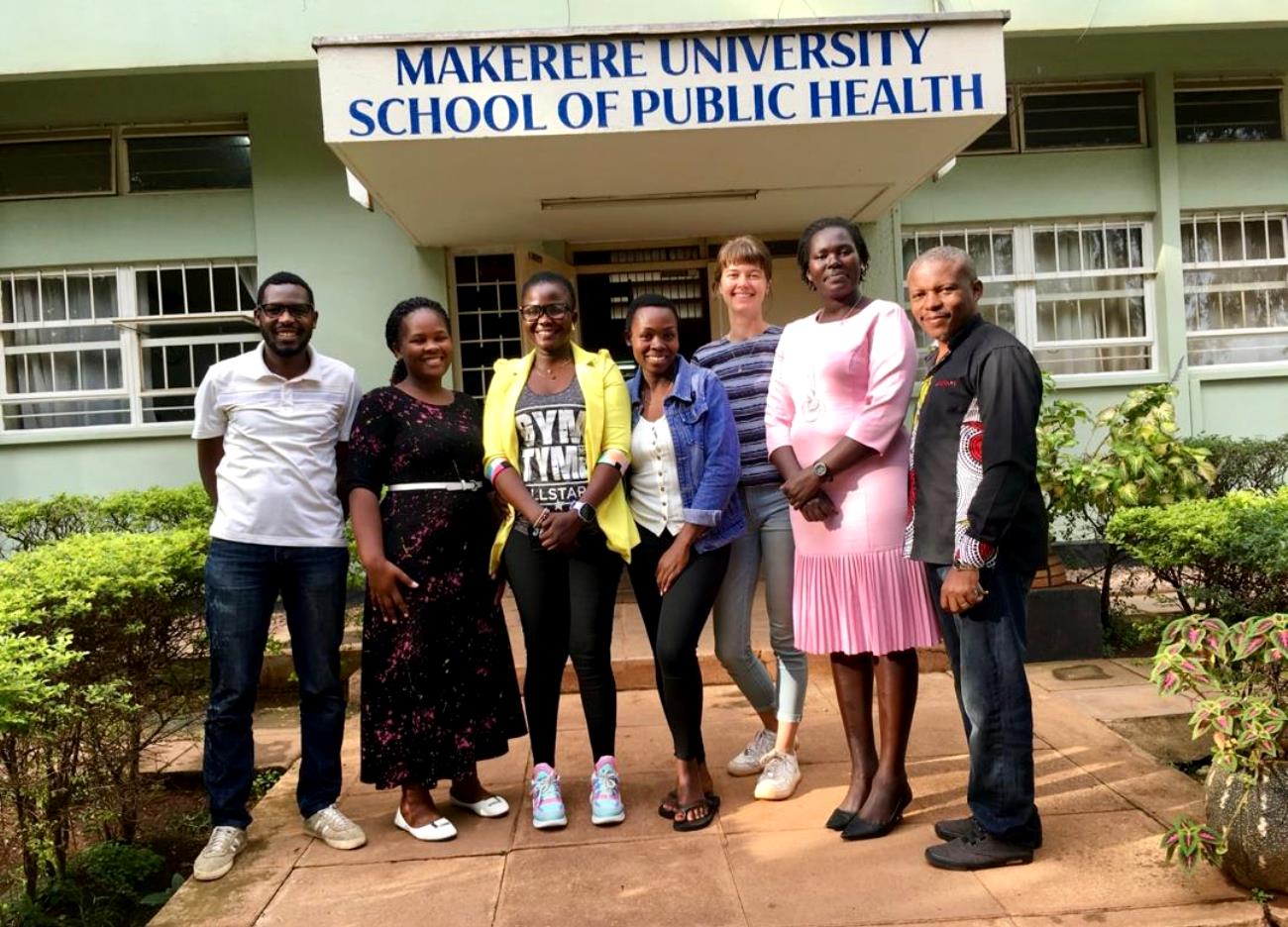
At MakSPH, Laura immersed herself in courses like epidemiology, struggled briefly with statistics, but thrived on critical discussion groups and consultation with lecturers.
Collaborating with classmates from Uganda and across East Africa, she learned Luganda phrases and Somali proverbs, and built a “family” united by late-night study sessions and shared ambitions.
Beyond expectations
For Laura, studying at MakSPH was the best decision she could have made. She is still struck by the faculties’ wealth of academic and professional experience in public health and disaster management.
“I anticipated the programme would focus on applying the knowledge we gain to real-world scenarios. Of course, there were cultural differences that took me time to adjust to. I am grateful to faculty members such as Prof. Christopher Garimoi Orach, for his dedication and support, Prof. Elizeus Rutembemberwa for leading by example and valuing students’ time, and Dr. Justine Bukenya and Dr. Simon Kibira for offering their extensive support as my dissertation supervisors.”
The Fieldwork Attachment that Transformed Laura’s Research Experience
At Rhino Camp refugee settlement in West Nile, Laura’s work took on new meaning. Partnering with the Uganda Red Cross Society, she helped digitize data tools and walked long distances through Tika Zone, inspecting latrines and speaking with South Sudanese girls about their challenges in managing their menstrual health through their project that focused on schools.
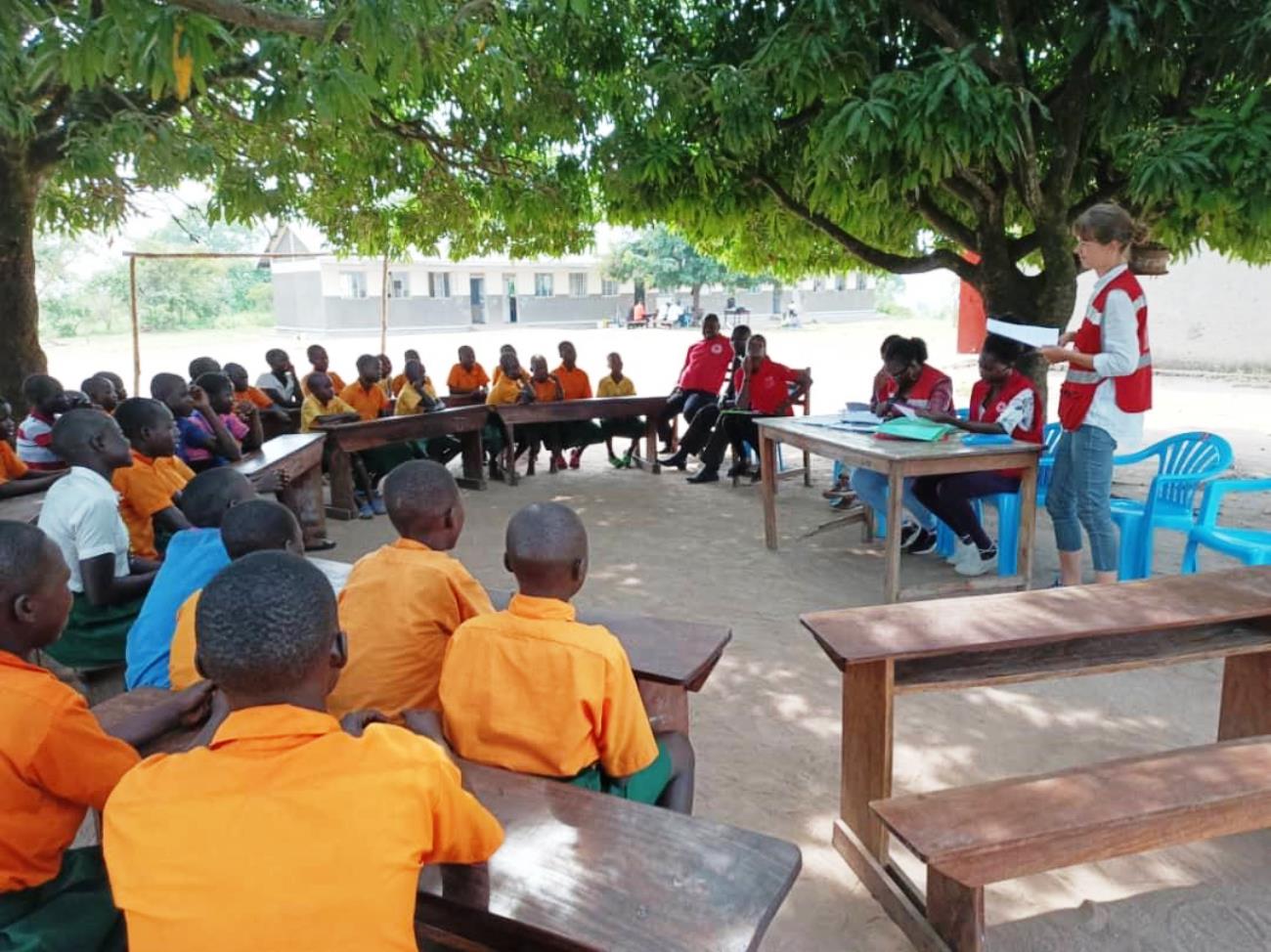
“That experience in West Nile influenced my own research ideas, and it was a privilege to later return to Rhino Camp for data collection. I will always remember the long days walking with my research assistants through villages and being graciously welcomed by so many respondents,” she recalls, noting that the experiences crystallized her resolve to advocate for refugee dignity globally.
Life in Kampala
Life in Kampala, with its vibrant energy and unique challenges, was truly a ‘full sensory experience’ for Laura. “My parents live in a small village, so Edinburgh felt like a big city when I moved there. And Edinburgh is much smaller and quieter than Kampala! But on weekends, I loved going downtown to shop at Owino Market or heading to Kyadondo Rugby Club for some pork.”
These spaces were perfect for Laura, offering new cultural experiences, including matooke, a starchy dish not found in the UK, which is mainly eaten in Uganda as a local delicacy and staple meal. Despite the differences in culture, sharing meals with classmates provided Laura with a comforting sense of connection.
Back to academics, navigating the university administrative processes wasn’t seamless initially for Laura, though. She says administrative hurdles such as paper-based systems, could change for the university to comfortably enjoy its strong reputation.
She recalls, right at the beginning, when she couldn’t find sufficient information online to support her to complete her application to join Makerere University. However, she later received support from the University’s International Office that deals with the welfare of international students.
Other university officials, from finance, librarians, program administrators, to academic registrars, played a key role in supporting her in her research and postgraduate training. “The system relies on dedicated individuals,” she noted, calling for digital reforms while praising MakSPH’s “atmosphere of innovation.”
“From my experience, such as when obtaining my transcript, the system relies heavily on individual staff members working around these administrative challenges. I’m grateful for those who helped me navigate this, and I’m interested to see how the university continues its digital transition, as it could greatly streamline processes in the future,” says Laura.
A Bittersweet Graduation Day
On graduation day, Laura’s pride mingled with melancholy. Watching families cheer on graduates, she reflected on classmates sidelined by finances or family crises.
Having gone through the course and interacted with Ugandan students, Laura hints on the common financial and personal challenges preventing many from graduating: family illness, new children, sponsorship falling through.
“I know so many of my classmates had worked so hard and were almost over the finish line but, due to financial challenges or other commitments at home, it wasn’t possible for them to graduate this year,” she says.
“For me, I was able to make the choice to pursue this program before having children, so I had fewer responsibilities at home, and I had also been saving for many years to get the money to pay tuition. Because I knew I had the money for tuition before I started, I could focus on studying. As you know, the reality for many people is that that’s not always possible.
“Small supports can transform student experiences,” Laura emphasized, advocating for systemic empathy. She sees great potential for more pastoral support at the university, citing peers from UCU and Kyambogo who benefited from accommodations like private breastfeeding spaces and flexible deadlines in special circumstances. Such initiatives, alongside financial aid, could significantly improve student welfare.
Still, the ceremony’s electric energy—watched via livestream by her parents in Europe—symbolized hope. “Uganda taught me that collaboration transcends borders,” she reflected.
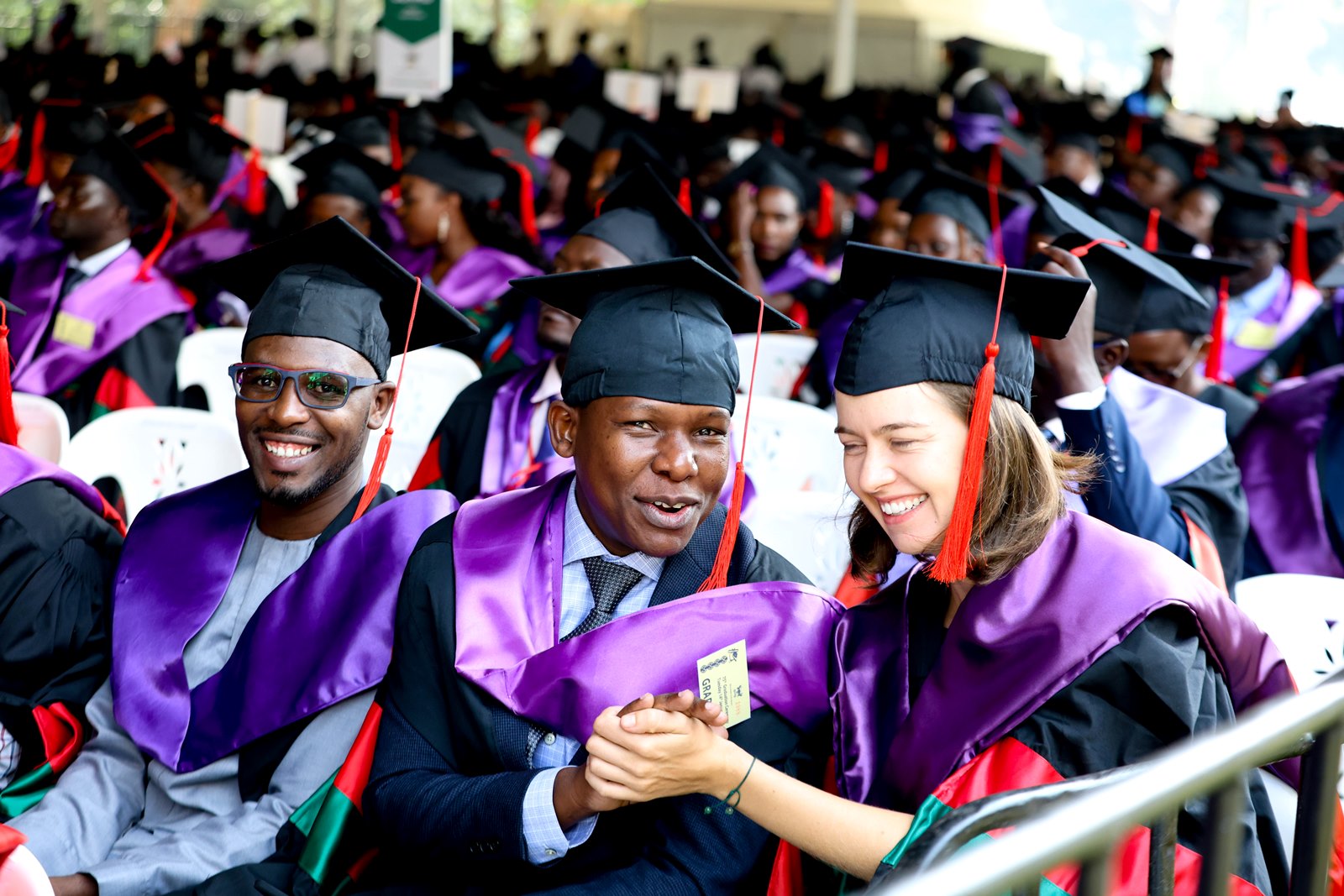
“You could feel this sense of how hard everyone had worked to reach up to that point and that this was really an opportunity for them to celebrate, particularly by having family and friends around to be able to see. I love the PhD awards, when you see the PhD students coming out and their families rushing up to greet them. To me, that’s the best part of the ceremony, because a PhD requires so much work and commitment, and I think it’s really emotional to see everyone share this moment with their support networks,” she says.
Adding that; “…I was so grateful that the ceremony was streamed online. My family were watching live at home in Europe and it was so special that they could see me on camera and participate in the ceremony that way as well.”
Laura noted striking similarities between Makerere and Edinburgh’s ceremonies, especially the moment when students were asked to turn and thank their families, an emotional and powerful tradition.
Looking Ahead
Now in Tanzania, Laura eyes roles with international NGOs, armed with Ugandan-taught pragmatism and a zeal to challenge Europe’s refugee policies. “MakSPH gifted me more than a degree—it reshaped my worldview,” she says.
“As a muzungu with a Ugandan postgraduate education, I feel privileged to have benefitted from different educational perspectives, and I hope that the skills and knowledge I acquired during my time at Makerere will help me to secure a role with an international NGO. After witnessing the incredible support that Uganda provides to refugees, I also hope to advocate for more dignified policies concerning refugees in Europe,” she shares.
“There’s a spirit of innovation and dedication at Makerere, particularly when passionate lecturers like Prof. Orach, Dr. Roy Mayega, or Dr. Victoria Nankabirwa engaged students through discussion and sharing lived experiences. You could really see a different level of engagement within the students as well. Overall, I’ve had such a fantastic experience at Makerere University.”
“I wouldn’t change a thing,” she smiles.“Except maybe convince more Europeans to study here. Africa’s wisdom is the future.”
You may like
-
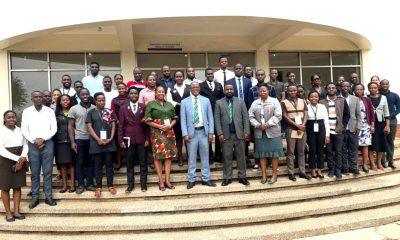

Mak Moves to Revitalize Food Technology & Business Incubation Centre to Drive Innovation & Entrepreneurship
-


Makerere University Fees Waiver for 40 First Year Female Students 2025/2026
-
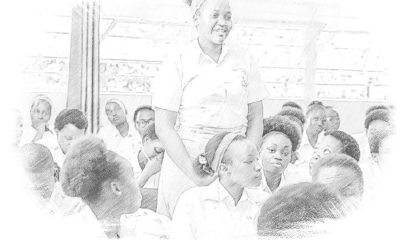

Ugandan Study Flags Girls and Senior Students as a Mental Health High-Risk Group
-
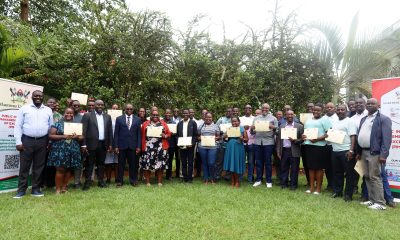

Makerere’s PIM Centre Concludes Training on Certificate of Financial Implications (CFI)
-


Call for Applications: Responsible Conduct of Research (RCR) Training Course
-
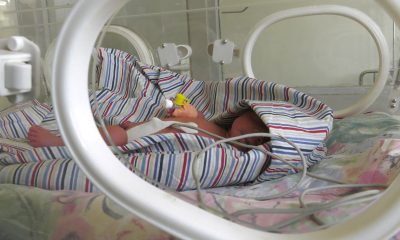

Call For Applications: PhD Fellowship Training Position
Health
Ugandan Study Flags Girls and Senior Students as a Mental Health High-Risk Group
Published
3 days agoon
July 12, 2025
Based on research led by Max Bobholz and colleagues from Makerere University in Uganda, Essentia Institute of Rural Health, and the Medical College of Wisconsin in the United States.
Adolescence is meant to be a time of holistic growth and self-discovery, but for many Ugandan teenagers, this period is becoming a season of silent mental health struggles. A new study published in PLOS Global Public Health has uncovered a silent but growing crisis: nearly one in five Ugandan secondary school students in the study areas have signs of an emotional disorder. These conditions included anxiety, depression, post-traumatic stress disorder (PTSD), and adjustment disorders often involving excessive worry, sadness, fear, or mood instability. Also, one in 20 adolescents exhibited behavioral issues ranging from attention-deficit/hyperactivity disorder (ADHD) and oppositional defiant disorder to substance use and other risky behaviors like alcohol use.
The study, led by Max Bobholz, a PhD candidate in Public and Community Health at the Medical College of Wisconsin, surveyed a sample of 1,953 students aged 10 to 18 years enrolled in eight secondary schools in Iganga district in Eastern Uganda and Mukono district in Central Uganda. This was one of the most comprehensive efforts yet to understand the prevalence and drivers of mental health challenges among school-going Ugandan adolescents.
“We are looking at a generation facing a complex blend of stressors, namely, academic, social, and emotional,” says Bobholz. “Our findings show that certain groups are especially vulnerable, and schools need to be equipped to respond.”

This study results, published on June 12, 2025 was funded by the Swedish International Development Cooperation Agency (SIDA), a government agency of the Swedish Ministry for Foreign Affairs, through the Makerere University Postdoctoral Fellowship to one of the investigators, Dr. Catherine Abbo. Other researchers included Julia Dickson-Gomez, Arthur Kiconco, Abdul R. Shour, Simon Kasasa, Laura D. Cassidy, and Ronald Anguzu.
According to the study, girls bear a higher emotional burden. Researchers found that female students had nearly two times higher odds of suffering from emotional disorders such as anxiety or depression than their male peers.
Dr. Catherine Abbo, an Adolescent Psychiatrist and Associate Professor at Makerere University, attributes this to both biological and socio-cultural factors. “Puberty brings hormonal shifts that can heighten emotional sensitivity,” she explains. “But just as importantly, Ugandan girls often face intense pressure to conform to gender roles while also navigating issues like body image, harassment, and future uncertainty.” The researchers are calling for gender-sensitive mental health interventions, particularly in schools, where early support could help mitigate long-term mental health issues.

Higher associations in older teens?
Age also emerged as a key associated factor, with each additional year increasing the odds of behavioral disorders by 20%. “As adolescents grow older, they are more prone to risk-taking, impulsivity, and resistance to authority,” explains Dr. Simon Kasasa, a senior lecturer and biostatistician at Makerere University School of Public Health.

“Combine that with academic pressure and identity-related stress, and it’s no surprise we’re seeing more conduct issues in late adolescence,” Dr. Ronald Anguzu, an Assistant Professor in the Institute for Health and Humanity at the Medical College of Wisconsin, added. This study raises critical questions about whether and how Ugandan secondary schools support older students as they transition toward adulthood.
The unseen influence of family mental health
The study also found that adolescents with a family history of mental illness had twice the odds of exhibiting behavioral problems compared to those without such a history.
“This speaks to the intersection of genetics and environment,” says Bobholz. “Living in a household with people affected by mental illness can mean instability, stigma, and lack of emotional support, all of which weigh heavily on a developing mind.”
The authors recommend that school mental health screening include family mental health history and advocate for greater collaboration between education and health sectors to support at-risk households.

Private schools: High marks, higher stress?
Interestingly, students in private schools had 1.4 times the odds of experiencing emotional disorders compared to those in public schools. Private schools, often seen as academic havens, may inadvertently be cultivating high-pressure environments. “There’s an assumption that better facilities mean better well-being,” says Dr. Abbo. “But intense academic competition, social isolation, and a lack of trained counselors can create emotional pressure cookers.”
Previous research in 47 secondary schools across five districts (Rakai, Kyotera, Masaka, Lwengo, and Kalungu) in southwestern Uganda found that economic and family support helped reduce absenteeism among adolescent girls in secondary schools. However, this support did not significantly improve behavior or reduce grade repetition. The region, which includes districts like Rakai and Masaka, also faces a higher burden of HIV, adding to the challenges young people experience.
Meanwhile, a review of data from 42 primary schools in Luwero District identified school-based mental health interventions such as cognitive behavioral therapy and mindset-building approaches as being particularly effective. Researchers now suggest that integrating these strategies, along with efforts to reduce school violence, could go a long way in improving the mental health of Ugandan adolescents.
A-Level pressure: Academic ambition meets mental health strain
The study also found a correlation between advanced (A’level) education and increased risk of emotional disorders. “We selected one school district from each region based on population and past academic performance. As these students prepare for university or the job market, the pressure to succeed becomes enormous,” says Kasasa. “They’re facing a future full of uncertainty, with very little structured mental health support to help them cope.”

A wake-up call for Uganda’s education and health systems
The authors of this study assert the urgent need for school-based mental health programs, especially in private and A-level institutions. These programs should offer routine screening, emotional support, and training for teachers to recognize warning signs of mental health disorders.
Importantly, this study adds weight to calls for a national adolescent mental health policy, tailored to Uganda’s context, with interventions that bridge health, education, and social services.
“Our data shows that mental health challenges are not a fringe issue,” says Bobholz. “They are widespread, significant, and deeply tied to school, home, and society.”
The COVID-19 school closures between 2020 and 2022 deepened feelings of isolation and financial strain, with out-of-school adolescents reporting depression rates as high as 21.5% to 50% higher than their peers who remained in class, according to research published in February 2025. Yet Uganda invests less than 1% of its health budget in mental health, with just one psychiatrist per million people, leaving many teens to cope through cheap alcohol used by 28% of urban youth or untrained healers, as reported by the government paper The New Vision in April 2025. With only 26% of students completing lower secondary school and 35% of the population under age 24, these mental health challenges now pose a serious threat to the country’s future.
Mercy Akankunda of Proven Foundation, a Ugandan NGO supporting vulnerable groups, warns that mental health struggles are quietly eroding the well-being of the country’s youth, over 12 million strong and making up 35% of the population. “These teens are not just statistics. They are the future of Uganda, she asserts. If Uganda hopes to reap the dividends of its young population, addressing adolescent mental health must become and remain a national priority, not just for treatment, but for prevention, resilience, and hope.
Reference:
Bobholz, M., Dickson-Gomez, J., Abbo, C., Kiconco, A., Shour, A.R., Kasasa, S., Cassidy, L.D., & Anguzu, R. (2025). Correlates of behavioral and emotional disorders among school-going adolescents in Uganda. PLOS Global Public Health. Read the study here
Health
Call for Applications: Responsible Conduct of Research (RCR) Training Course
Published
4 days agoon
July 11, 2025By
Mak Editor
The Responsible Conduct of Research (RCR) Training Course, scheduled to take place from July 30th to August 1st, 2025, at the Makerere University College of Health Sciences’ Conference Room.
Background
The SUSTAIN: Advancing Makerere University Masters of Health Sciences in Bioethics program at Makerere University College of Health Sciences aims at developing and institutionalizing a mentorship program in research ethics that facilitates development of bioethics professionals and health researchers who are committed to the growth and application of research ethics in Uganda’s academic and research institutions to the highest possible degree. The Responsible Conduct of Research (RCR) course is one of the short courses that introduces trainees to a framework that involves application of established scientific, professional norms and ethical principles in the performance of all activities related to scientific research.
Course objectives
At the end of this course, trainees should be able to identify, manage and prevent research misconduct.
Course outline
Introduction to RCR; Introduction to Professionalism and Ethics; Human subject’s protection and regulatory framework in Uganda; Humane handling of animal research subjects; Conflict of interest;
Responsible laboratory practices; Mentor-mentee relationships; Collaborative research international, industry); Peer review; Research misconduct (including policies for handling misconduct); Community involvement during research in a low resource setting; Responsibility to society and environment; Responsible financial management; Data acquisition, management, sharing and ownership; Responsible authorship, publication and communication.
Target group
The Responsible Conduct of Research course is targeted at Researchers, Research administrators, Research assistants, Study coordinators, Graduate students and Student supervisors. Certificates will only be awarded to participants with 80% attendance.
Course fee: 205,000/=, or 56USD is payable.
The course fee will cater for meals and refreshments during the training period.
Payment & Registration procedure:
9030026194023, Stanbic Bank, Mulago, Makerere University Biomedical Research Center Limited
Dollar Currency:
9030026194147, Stanbic Bank, Mulago, Makerere University Biomedical Research Center Limited
Please Note: Share payment details on email/whatsup and a hardcopy deposit slip delivered on the first day of the training to Miriam Musazi, Department of anatomy, Bioethics Centre, Room C4,
Mob: +256 782 363 996/ +256 701 363 996, Email: mmusazi@gmail.com.
NB. Only those who will have paid by this date will be considered for the course
Venue: The training will take place at Makerere University College of Health Sciences’ Conference room
Health
Call For Applications: PhD Fellowship Training Position
Published
5 days agoon
July 10, 2025By
Mak Editor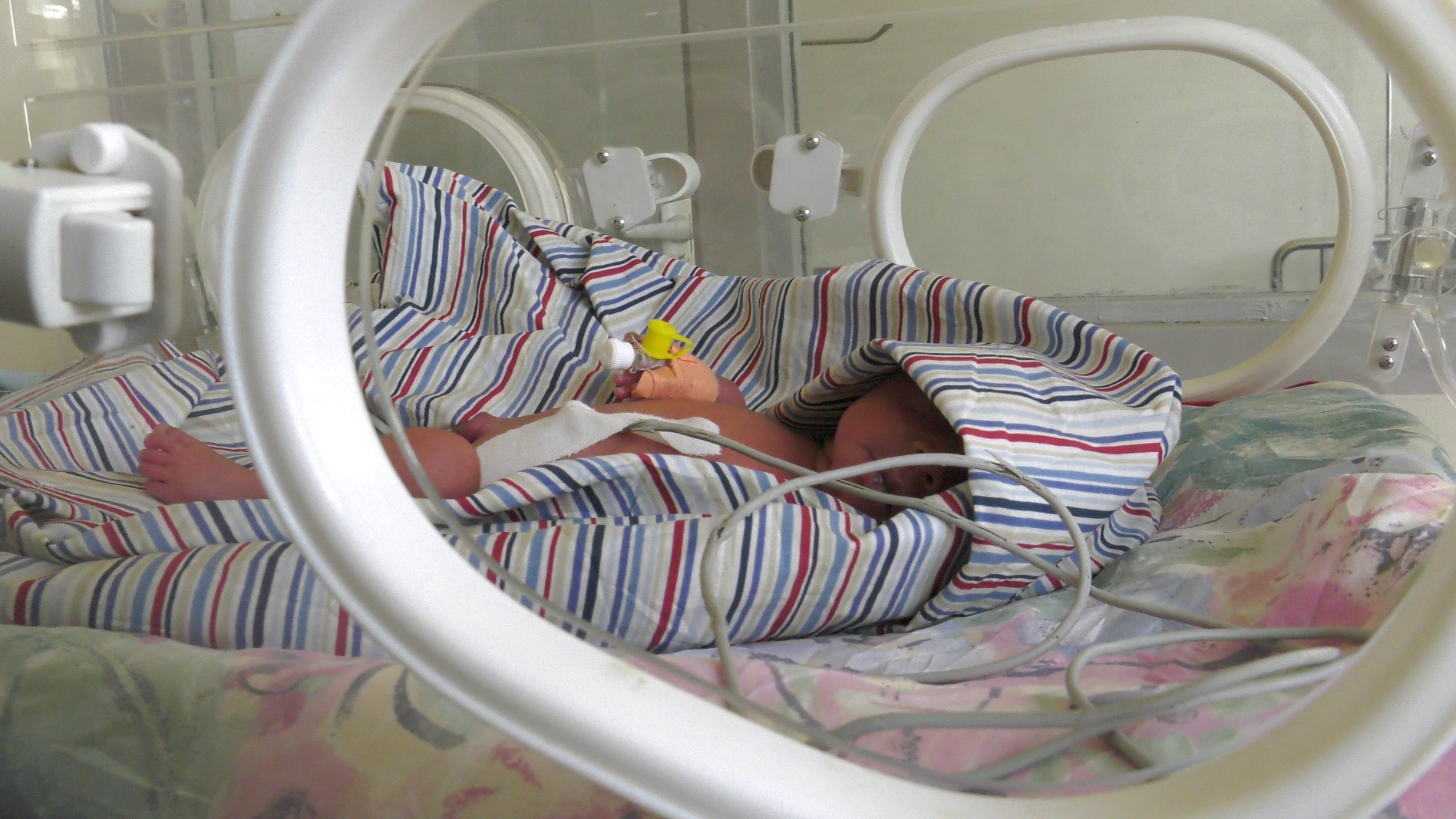
Background:
Makerere University College of Health Sciences (MakCHS), Kampala, Uganda and Global Health Uganda (GHU); in collaboration with other research consortium partner institutions, including, Kenya Medical Research Institute (KEMRI), Kisumu, Kenya; Training and Research Unit of Excellence (TRUE), Blantyre, Malawi; University of Bergen, Bergen, Norway; University of Amsterdam, The Netherlands; and Liverpool School of Tropical Medicine (LSTM), UK have been conducting clinical research on Malaria Chemoprevention. This research has focused on Malaria Chemoprevention in vulnerable patient populations, including children with severe anaemia, children with sickle cell anaemia and pregnant women. As an example, two of our recently completed studies are “The post-discharge malaria chemoprevention in children with severe anaemia [https://pubmed.ncbi.nlm.nih.gov/33264546/] and Malaria chemoprevention in children with sickle cell anaemia [https://pubmed.ncbi.nlm.nih.gov/39718172/]”.
With support from the UK Research and Innovation (UKRI) body, the consortium is expanding these studies to children with severe acute malnutrition, by conducting a large multi-centre randomized controlled trial entitled “Chemoprevention of malaria in the postdischarge management of children with severe acute malnutrition in Malawi and Uganda”.
In Uganda, the study will be conducted at one or two of their study sites in Jinja Regional Referral Hospital, Hoima Regional Referral Hospital or Kitgum General Hospital. Makerere University College of Health Sciences (MakCHS) and Uganda and Global Health Uganda (GHU) seek to appoint a full-time PhD Fellow, on this study. This will be a 4-year post, tenured at Makerere University and hosted at MakCHS.
Expectations of the PhD fellowship:
The PhD fellow will:
- Be a part of the main trial team, and participate fully in its implementation. However, he/she will be expected to design and develop his/her PhD research project, nested in the main trial.
- The area of study will be around “interactions between anaemia and severe acute malnutrition (SAM) in children or the interactions between malaria and severe acute malnutrition in children”.
- Conduct rigorous research, leading to high quality scientific publications.
- Submit a full research concept and obtain registration in the University by end of year-one. As such, there be an initial appointment for one year, renewable upon satisfactory performance.
- Academic mentorship and supervision will be provided by the research consortium (see above – composed of national and international researchers).
- Doctoral scholarly support and training environment, as well as didactic training in research methods and scientific writing skills will be provided by Makerere University.
- The funding support will cover tuition and a competitive monthly stipend for 4 years, scientific conferences fees/travel and other research-related costs.
Prospective candidates must:
- Hold Master’s of Medicine in Paediatrics and Child Health from a recognized university, and licensed to practice medicine in Uganda by the UMDPC.
- Possess undergraduate training in Medicine and Surgery (MBChB/MBBS/MD).
- Willingness to fully commit time and effort to their PhD studies, expected to start immediately
- Candidate should not hold other/concurrent fellowships
- Having publication experience will be an added advantage.
- Be highly motivated and willing to commit to a career in research and academia.
Application procedure:
Interested applicants should submit their application and supportive documents – listed here below, in one PDF document, in an email titled “PDMC-SAM–PhD Fellowship Application” to hr@globalhealthuganda.org [and cc – chdc.desk@mak.ac.ug] by 25th July 2025. The documents should include the following:
- An application letter (Max. 1 page)
- Motivation statement (Max. 500 words)
- CV (Max. 2 pages), including a list of publications
- Two (2) recommendation letters
- Academic transcripts and certificates for all university qualifications
- A synopsis focusing on the proposed PhD research work, describing briefly what is already known/burden, challenges, the gaps and potential interventions (include references) [Max. 800 words].
Trending
-

 Education2 weeks ago
Education2 weeks agoAdmission List to Bachelor of Education External (BED) 2025/26 -Private Sponsorship
-

 General1 week ago
General1 week agoRe-advert: Admission to Undergraduate Programmes 2025/2026
-
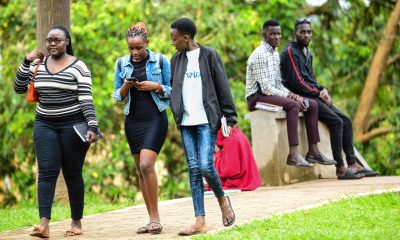
 General2 weeks ago
General2 weeks agoAdmission Lists -Disability and District Quota Schemes 2025/26
-
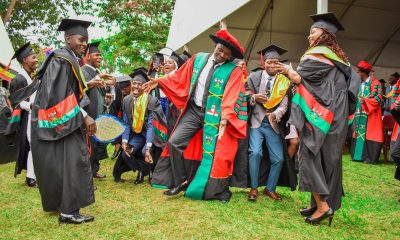
 General2 weeks ago
General2 weeks agoDiploma/Degree Holders Scheme – Self Sponsorship Admission Lists 2025/26
-

 General6 days ago
General6 days agoRe-Advert for Applications for Diploma and Certificate Training
